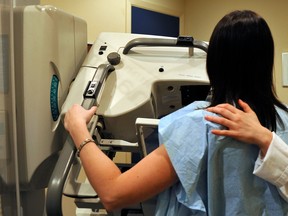
Opinion: We have made progress but more needs to be done so that women who are at greater risk of having a cancer missed can get supplemental screening.

Article content
How dense are you? This is a conversation between women that I wish we had over coffee or dinner, but we aren’t quite there yet.
Before 2018, despite recording it on mammography reports for over three decades, no province had informed women about their breast density (BI-RADS categories A to D). In 2018, B.C. was the first to add this information to screening result letters.
Advertisement 2
Article content
Article content
This is critical information. An individual’s breast density can’t be felt or seen. Those with dense breasts are at greater risk of having a cancer missed, given that both cancerous tumours and dense tissue appear white on a mammogram — this has been compared with finding a snowball in a snowstorm. To make things worse, women with Category D are four to six times more likely to develop breast cancer in their lifetime.
Dense Breasts Canada was established in 2016 by a group of women who experienced the consequences of not knowing our breast density. We rallied women to request their density category through their screening program, to complete petitions, to send letters to government officials and to speak in the B.C. legislature until policies were changed.
We were thrilled when the policy was changed to include breast density information. Women with dense breasts could now be aware of the risks and advocate for supplemental ultrasound or MRI screening, which is shown to identify breast cancer earlier, improve survival and reduce the severity of treatment options.
Article content
Advertisement 3
Article content
Since 2016, we have continued our advocacy efforts to ensure that all Canadian women are notified of their breast density, no matter their postal code. The final province, Newfoundland, committed to notifying women there last month.
Unfortunately, there is still a gap in screening, and it’s vast.
Firstly, B.C. Cancer’s breast screening program doesn’t provide ultrasound or MRI. A woman needs a requisition through their family doctor, which leaves a disconnect between mammogram results and supplemental screening.
Secondly, to get a doctor’s requisition, one needs a doctor. In B.C., 23 per cent of people don’t have a family doctor, leaving walk-in clinics and the associated waiting times as the only option. Often, women are denied requisitions as many doctors aren’t educated on breast density or the essential supplemental screening required.
Thankfully, we are a province with innovation at our core.
CanScreen B.C., was co-founded in 2022 by Dr. Cal Shapiro and Dr. Stuart Bax, who saw a consistent gap in access to cancer screening and surveillance for their patients. In response, they created a virtual cancer screening service to make screening more accessible for anyone in B.C. without a doctor or who has difficulty getting screening requisitions. CanScreen B.C. has since sent thousands of patients for screening and supplemental screening for breast, colorectal and lung cancer.
Advertisement 4
Article content
Here lies the last obstacle: Women are challenged with finding clinics that provide the dense breast ultrasound or MRI, and when they do, the waiting list can be up to a year. Why? A critical shortage of medical imaging technologists and an MSP code fee that isn’t enough to cover screening time and costs. (The code assigned to this procedure is the same as a diagnostic ultrasound procedure for a specific area where a woman has found a lump or noticed a change, while a screening ultrasound procedure encompasses screening both entire breasts, which takes much more time. As most clinics in the province are private, they are not inclined to accept this financial loss.)
Again, B.C.’s problem-solving shines bright.
In 2023, West Coast Medical Imaging in Victoria procured an automated breast-imaging ultrasound machine (ABUS), which scans up to 16 women a day compared with three using traditional hand-held ultrasound. In just four months, the team obliterated backlogs in ultrasound screening for patients with dense breasts on Vancouver Island. In the 600-plus scans performed, six small cancers missed entirely through mammography were identified using ABUS, changing the prognosis for these women had the cancers progressed to a noticeable lump.
Advertisement 5
Article content
So, have we solved all the issues?
Not yet. Women still require a requisition. Only one clinic in B.C. has an ABUS machine, and supplemental screening isn’t adequately linked to the provincial screening program.
The solution? B.C. Cancer’s breast screening program needs to refer women with dense breasts for ultrasound screening automatically, and ABUS machines should be accessible in every B.C. hospital or publicly funded screening clinic.
If supplemental screening were recognized as necessary so that all women, no matter their breast density, had the same chance of finding cancer early, then maybe it would be a regular topic of conversation over coffee.
But there is more to be done to take this over the finish line.
Michelle Di Tomaso is co-founder of Dense Breasts Canada, a YWCA 2024 Woman of Distinction nominee, and a breast cancer survivor and advocate.
Recommended from Editorial
Bookmark our website and support our journalism: Don’t miss the news you need to know — add VancouverSun.com and TheProvince.com to your bookmarks and sign up for our newsletters here.
You can also support our journalism by becoming a digital subscriber: For just $14 a month, you can get unlimited access to The Vancouver Sun, The Province, National Post and 13 other Canadian news sites. Support us by subscribing today: The Vancouver Sun | The Province.
Article content

